I have been thinking. During trans Atlantic flights there is time for that. I just came home from Project Horseshoe in Texas, and being there led me to emphasize some thoughts to the point of this text being written, right now.
I remember when I was sitting by the harbor in Savannah in the autumn of 2005 and a big ship passed by. I felt an instant identification. That is me. I have done like that. I set out a course and I follow it, slowly, steadily. Since 1995 I have been exploring how syntax of program code can be used for story construction. I still do it. I don’t know if I am any closer to an answer, but the course is set. In the end of this year I will be done with my thesis. I might consider a change of course then. Maybe not. Time will tell.
An effect of this has been that I have been using this course as a support when I have made choices, big and small. Other principles, or foundations for choices, have not been as important. I can feel a loss.
So the past months I have been adding an approach. In my thoughts I call it “the poetic principle”. I don’t mean poetry in terms of artifacts of text, but rather in terms the deep meaning that is created by good poetry, high symbolism which is at the same time personal and general. A poetic action, choice, or non-choice, or just the appreciation of a situation is different for all of us.
For me, to add this principle, is to appreciate each situation in poetic terms. To see the absurdity, the unexpected beauty, the quirkiness and the nuances. I ask myself “which is the most poetic choice of action?”.
This approach has not brought any dramatic changes to my actions, nor has it been visible. But it has had a profound effect on the inside. I can’t say that I am dramatically happier, but I feel more like myself. I am having invisible fun, most of the time.
Blog Archive
Wednesday, November 12, 2008
FuturePlay 2008
November 3 – 5, Toronto, Canada.
FuturePlay is a yearly conference focusing on game design and technology, held in Canada.
I had the chance to go this year to present work I have done with Mike Sellers: we have both worked on agent based architectures for characters in multiplayer games. Doing so we have looked at what we can learn about the human mind from the deconstruction of it done in psychology and related areas. From this we need to reconstruct it in ways that are functional for targeted contexts and thus need to choose what theories to use, and how to use them. Both Mike and I use the five factor personality model as a base for agent personality, but when it comes to motivations and emotions our approaches differ. Nevertheless we have both ended up with uncanningly similar solutions for how to represent the mood of the player, which in both our systems serve to give players an overall idea about the emotional state of a character. In psychology little is written about mood. I think it is because it is such an aggregation of many states, and when one studies something we usually break it down to smaller parts in order to understand it. Both Mike and I have picked smaller parts and used that to build a representation of an overall state, and if you will, it is our approaches of how to interpret the human mind, as well as we can, with what we currently know. In our paper we compare our systems, focusing on the “tip of the iceberg”, i.e., the mood. I’ll throw up the presentation somewhere once I have cleaned it up a little.
FuturePlay 2008 was a very good conference. The standard of the publications and the presentations was high, and the keynotes were well chosen, giving us perspectives on the field that complemented each other nicely.
Here is a pointer to the schedule.
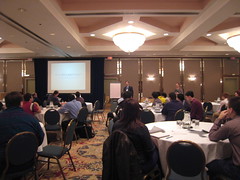
I especially appreciated the keynote by John Buchanan, where he showed a sketching method and software and pointed out the important difference between this and prototyping. Sketches are supposed to be thrown out. They cannot be continued on, the code improved to be used in the game. This gives freedom of thought and experimentation. This gives a sketch of the INTERACTION. I will download the software and try it out as soon as I can find it.
Here are my photographs from his speech, and some small videos of the demo (v1, v2, v3,v4).
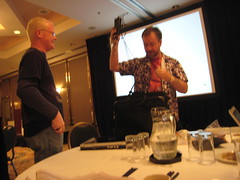
The other highlight for me was the speeches by Anders Tychsen (who has now changed his family name to Drachen). His speech at DiGRA last year in Tokyo was one of the highlights for me there, and this time he delivered no less than three papers: A feast of empirical data! ("Motivations for Play in Computer Role-Playing Games",
"Defining Personas in Games Using Metrics", "Game Format Effects on Communication in Multi-Player Games")
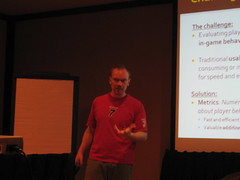
Not only are the conclusions possible to derive from the data useful, it is also very interesting to see the methodologies Anders applies, especially the hierarchical coding schemes and the protocol analysis.
Here is a mix of photos from his speeches.
Another paper that I will look closer at is “Using Conflict Theory to Model Complex Societal Interactions” presented by Ben Medler from Georgia Tech. I hope that can be able to use it for help as I continue modeling the affective actions and the spell system in WoM. (More about this in upcoming notes from Project Horseshoe)
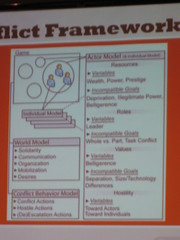
While the work by Anders Drachen/Tychsen, John Buchanan and Ben Medler were immediately relevant to my own work, I also appreciated the work presented by José Zagal at DePaul and by Clara Fernandéz-Vara at MIT.
Jose argued in “A Framework for Games Literacy and Understanding Games” that understanding games requires the use of perspectives from different contexts, such as in human culture, other games, technological platforms and by deconstructing and understanding their components and how these facilitate experiences for the players.
Here are my photos of his slides.
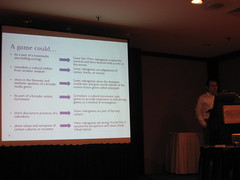
Clara shared in “The Game Studies Practicum: Applying Situated Learning to Teach Professional Practices” experiences from an eight week summer course where students produce game prototypes using SCRUM, and in each prototype explore a question given to them by resident researchers at MIT (“product owners”). Here are my photos of her slides.
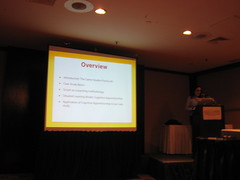
Despite the jetlag I managed to stay awake every now and then not only to listen to the speeches, but also to do some socializing. A bunch of us found an amazing game store, the “hairy tarantula” where José helped me pick out some RP books. I was after Wraith: The Oblivion, which I can’t find in my shelf anymore, and I didn’t find it but…let’s just say that my suitcase became very heavy :)
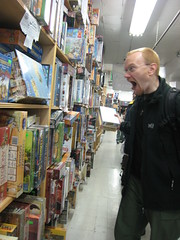
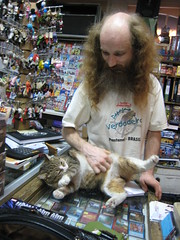
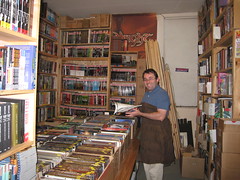

FuturePlay is a yearly conference focusing on game design and technology, held in Canada.
I had the chance to go this year to present work I have done with Mike Sellers: we have both worked on agent based architectures for characters in multiplayer games. Doing so we have looked at what we can learn about the human mind from the deconstruction of it done in psychology and related areas. From this we need to reconstruct it in ways that are functional for targeted contexts and thus need to choose what theories to use, and how to use them. Both Mike and I use the five factor personality model as a base for agent personality, but when it comes to motivations and emotions our approaches differ. Nevertheless we have both ended up with uncanningly similar solutions for how to represent the mood of the player, which in both our systems serve to give players an overall idea about the emotional state of a character. In psychology little is written about mood. I think it is because it is such an aggregation of many states, and when one studies something we usually break it down to smaller parts in order to understand it. Both Mike and I have picked smaller parts and used that to build a representation of an overall state, and if you will, it is our approaches of how to interpret the human mind, as well as we can, with what we currently know. In our paper we compare our systems, focusing on the “tip of the iceberg”, i.e., the mood. I’ll throw up the presentation somewhere once I have cleaned it up a little.
FuturePlay 2008 was a very good conference. The standard of the publications and the presentations was high, and the keynotes were well chosen, giving us perspectives on the field that complemented each other nicely.
Here is a pointer to the schedule.

I especially appreciated the keynote by John Buchanan, where he showed a sketching method and software and pointed out the important difference between this and prototyping. Sketches are supposed to be thrown out. They cannot be continued on, the code improved to be used in the game. This gives freedom of thought and experimentation. This gives a sketch of the INTERACTION. I will download the software and try it out as soon as I can find it.
Here are my photographs from his speech, and some small videos of the demo (v1, v2, v3,v4).

The other highlight for me was the speeches by Anders Tychsen (who has now changed his family name to Drachen). His speech at DiGRA last year in Tokyo was one of the highlights for me there, and this time he delivered no less than three papers: A feast of empirical data! ("Motivations for Play in Computer Role-Playing Games",
"Defining Personas in Games Using Metrics", "Game Format Effects on Communication in Multi-Player Games")

Not only are the conclusions possible to derive from the data useful, it is also very interesting to see the methodologies Anders applies, especially the hierarchical coding schemes and the protocol analysis.
Here is a mix of photos from his speeches.
Another paper that I will look closer at is “Using Conflict Theory to Model Complex Societal Interactions” presented by Ben Medler from Georgia Tech. I hope that can be able to use it for help as I continue modeling the affective actions and the spell system in WoM. (More about this in upcoming notes from Project Horseshoe)

While the work by Anders Drachen/Tychsen, John Buchanan and Ben Medler were immediately relevant to my own work, I also appreciated the work presented by José Zagal at DePaul and by Clara Fernandéz-Vara at MIT.
Jose argued in “A Framework for Games Literacy and Understanding Games” that understanding games requires the use of perspectives from different contexts, such as in human culture, other games, technological platforms and by deconstructing and understanding their components and how these facilitate experiences for the players.
Here are my photos of his slides.

Clara shared in “The Game Studies Practicum: Applying Situated Learning to Teach Professional Practices” experiences from an eight week summer course where students produce game prototypes using SCRUM, and in each prototype explore a question given to them by resident researchers at MIT (“product owners”). Here are my photos of her slides.

Despite the jetlag I managed to stay awake every now and then not only to listen to the speeches, but also to do some socializing. A bunch of us found an amazing game store, the “hairy tarantula” where José helped me pick out some RP books. I was after Wraith: The Oblivion, which I can’t find in my shelf anymore, and I didn’t find it but…let’s just say that my suitcase became very heavy :)




Subscribe to:
Posts (Atom)